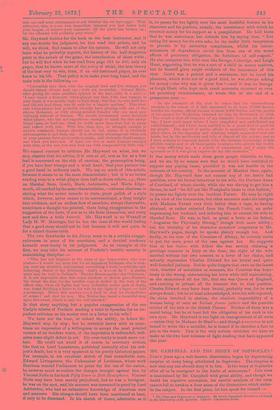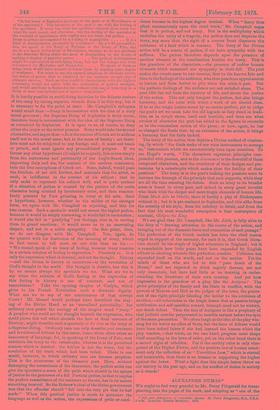MR. CAMPBELL AND THE IRONY OF SOPHOCLES.* -
FORTY years ago a well-known dissertation began by deprecating surprise at irony being attributed to Sophocles. The surprise is• now that any one should deny it to him. Is the irony of Sophocles after all to be consigned to the limbo of misnomers ? This view is maintained by Mr. Campbell with great ability, and though we doubt his negative conclusion, his careful analysis of the term, cannot fail to awaken a finer sense of the distinctions which under- lie the subject. In the first place, let him speak for himself :—
* The Plays and Fragments of Sophocles. By Lewis Campbell, Professor of Greek in the University of Si. Andrew. Oxford: Clarendon Press.
"Is the irony of Sophocles an irony of the poet, or of Providence, or of the spectator ? The intention of the poet is one with the fooling of the spectator. If irony was what the spectator enjoyed ,then irony was what the poet meant, not otherwise; but the feeling of the spectator at the contrast of appearance with reality was not irony, but pathos. . . , . Irony is always accompanied by a feeling of superiority It is a kind of dissimulation prompted by confidence. By a bold personifica- tion wo speak of the Irony of Fortune or the Irony of Fate, but we do not speak of the Irony of Providence, because we do not attribute to the Supreme Being either the need of dissembling or the desire of making a display of superior power The gods of Azistophanes might be represented as indulging irony, but not the beings who were reverenced by 1Eschylus and Sophocles To speak of thorn as using irony would have seemed to lower them by arguing some degree of weakness. For irony is not the natural language of absolute power, but rather of power that is hindered for the moment, though sure of ultimate success. Such an idea would b3 inconsistent with the highest reverence, would not agree with the conception of perfect strength, and would attribute to Sophocles the refined cynicism of believing in a Deity of clear conceptions and of narrow sympathies."
It is hardly possible to avoid doing injustice to the delicate texture of the essay by taking separate strands from it in this way, but it is necessary to fix the point at issue. Mr. Campbell's syllogism would stand thus :—Irony is inconsistent with the idea of a truly moral governor; the Supreme Being of Sephocles is truly moral, therefore irony is inconsistent with the idea of the Supreme Being as conceived by Sophocles. It is open to us, of course, to deny either the major or the minor premiss. Some would take the second alternative, and argue thus:—It is the essence of Greek art to address itself not to the moral sense, but to the sense of beauty ; art there- fore must not be subjected to any foreign end ; it must not teach or preach, and must ignore any premeditated purpose. If we favour any other hypothesis (it might be argued), this arises simply from the narrowness and pertinacity of our Anglo-Saxok ideas, importing duty and sin, the content of the modern conscience, into the free conceptions of Greek art. Some, indeed, would push the freedom of art still further, and maintain that the artist, as such, is indifferent to the content of his subject ; that he only seeks to represent his subject well, and is quite content if a situation of pathos is created by the picture of the noble character being crushed by involuntary error, and then remorse- lessly pursued by Fate grinning in irony at his acts. Such a hypothesis, however, whether in the milder or the stronger form, we agree with Mr. Campbell in rejecting, and this for two reasons. Such a spectacle would not create the higher pathos, because it would be simply harrowing, it would fail in moderation ; it would also fail in " purifying " our feelings, that is, in moving them to grand emotions ; it would move us to an enervating .despair, and not to a noble sympathy. On this point, then, we do not disagree with Mr. Campbell. Nor, again, do we quarrel with his limitation of the meaning of irony, which in fact seems to tell more on our side than on his : — " We cannot speak of an irony of feeling, because irony consists in a certain relation of feeling to expression." Precisely so. It is only the expression which is ironical, and not the thought. History —and the drama is history in miniature—is the revelation of God's thought in the world. His thought is Justice, but this is by no means always the spectacle we see. What are we to say when the relation of God's feeling to the expression of this feeling in history is one of contrast, and not of resemblance ? Take the opening chapter of Carlyle, which gives to his French Revolution such a dramatic dignity. What are we to say of the continuance of that corrupt Court ? Mansel would perhaps have described the stay- ing of the Divine Hand as an unrealised potentiality,' but ordinary men prefer the analogy of the simpler word "irony." A prophet who could see the thought beneath the expression, who could pierce this veil which shrouds the fate or final sentence of Destiny, might describe such a spectacle at the time as the irony of a Supreme Being. Ordinary men can only describe past contrasts and revulsions of fortune by this name, hence there often arises an inaccuracy of language, for, in speaking of the Irony of Fate, men attribute the irony to the catastrophe, whereas it is the permitted success which is ironical ; the failure is not the irony, but the revelation of the truth which had been veiled. There is one world, however, in which ordinary men can become prophets. This is the microcosm of the dramatic poet. Here, without destroying the naturalness of the characters, the perfect artist can give the spectator a sense of the pride which should in the sphere of justice be the precursor of a fall. Poetical justice, in that it implies the perfect resemblance of the sentence to the sin, has in its nature something ironical. So the Hebrew's ideal of the divine government was that the offender should " fall into the very pit that he bad made." When this poetical justice is made to permeate the language as well as the action, the expressions of pride or confi- dence become in the highest degree ironical. When " fancy thus plays unconsciously upon the cruel truth," Mr. Campbell urges that it is pathos, and not irony. But in the multiplicity which underlies the unity of a tragedy, the pathos does not disprove the irony, any more than the sight of a convex front disproves the existence of a back which is concave. The irony of the Divine action will be a source of pathos, if we have sympathy with the sufferer. The pathos therefore depends upon the presence of another element in the combination besides the irony. This is the grandeur of the characters,—the presence of nobler human elements which command our sympathy in their fall. The poet makes the events seem to run counter, first to the known fate and then to the feelings of the audience, who thus pass from apprehension to horror, and from horror to pity when the crisis is past. But the pathetic feelings of the audience are not satisfied alone. The poet lifts the veil from the mystery of life, and shows the justice of the action. This not only tempers the pathos, but also brings harmony, and the calm with which a work of art should close. If to us the tragic justice seems by no means perfect, yet to judge the poet's art we must take the old legends as they stood in tradi- tion, as in rough stone, hard and horrible, and then see what strokes of character the poet has added to the figures to reconcile us to the remorseless action of the piece; or how, again, he has so changed the finale that, by an extension of the action, it brings a harmony that the fable lacked.
The irony of the action thus depicts a Divine method of chasten- ing, by which " the Gods make of our vices instruments to scourge us," instruments which we unconsciously turn upon ourselves. To use Hegel's words, " The characters represent principles com- pounded with passion, and so the denouement is the downfall of those compound characters, and the overthrow of their designs and pre- tensions by a catastrophe which makes clear the futility of their passions." The irony is in the poet's making the passions seem to increase the triumph of the principle that each supports, while they are all the time ensuring the defeat. Such an irony in its broader sense.is found in every poet, and indeed in every great novelist who deals with the deeper and more tragic elements of human life. From Much Ado to Othello, there is hardly a play of Shakespeare without it ; but it is pre-eminent in Sophocles, and this alike from the severity of his style, from his subtlety in detail, and from the fact that his most wonderful conception is that masterpiece of contrast, CEITus the King.
We are glad that Mr. Campbell, like Mr. Jebb, is fully alive to the duty of " drawing attention to the course of the action, and bringing out of the dramatic force and connection of each passage." The perfection of the Greek models has been the chief reason urged in support of the anomaly, for such it is, that Greek litera- ture should be the staple of higher education in England ; but it is remarkable how little pains have been expended by English editors in showing wherein this perfection consists. Criticism has expended itself on the words, and not on the matter. Yet the minds of those who are led to this " pare fount of the Muses," and are expected to drink eagerly thereat, are not only immature, but have had little or no training in under- standing the literature of their own country. And yet how impressive is the grandeur of a play like the Antigone! The great principles of the family and the State in conflict, with the
powers of Heaven and Hell as the judges of the issue, the posses- sion of one right principle blinding the holder to the existence of another,—all culminates in the tragic lesson that as passion brings retribution and sell-sacrifice reward, triumph need not be victory,
nor death defeat. Then the fate of Antigone is like a prophecy of that judicial murder perpetrated in terrible earnest before the eyes
of the same generation. We often laugh at the idea of the play win- ning for its writer an office of State, but the fame of Athens would have been indeed fairer if she had learned the lessons which the play teaches,—that while, on the one hand, progress must shape itself according to the laws of order, yet on the other hand there is a sacred right of rebellion. For if the earthly ruler is only vice- gerent of the Higher Power, and the positive law of human enact- ment only the reflection of an " Unwritten Law," which is eternal and immutable, then there is no treason in supporting the higher against the lower. What a light does this simple lesson throw on our history in the past age, and on the conflict of duties in society as it stanch, I



































 Previous page
Previous page